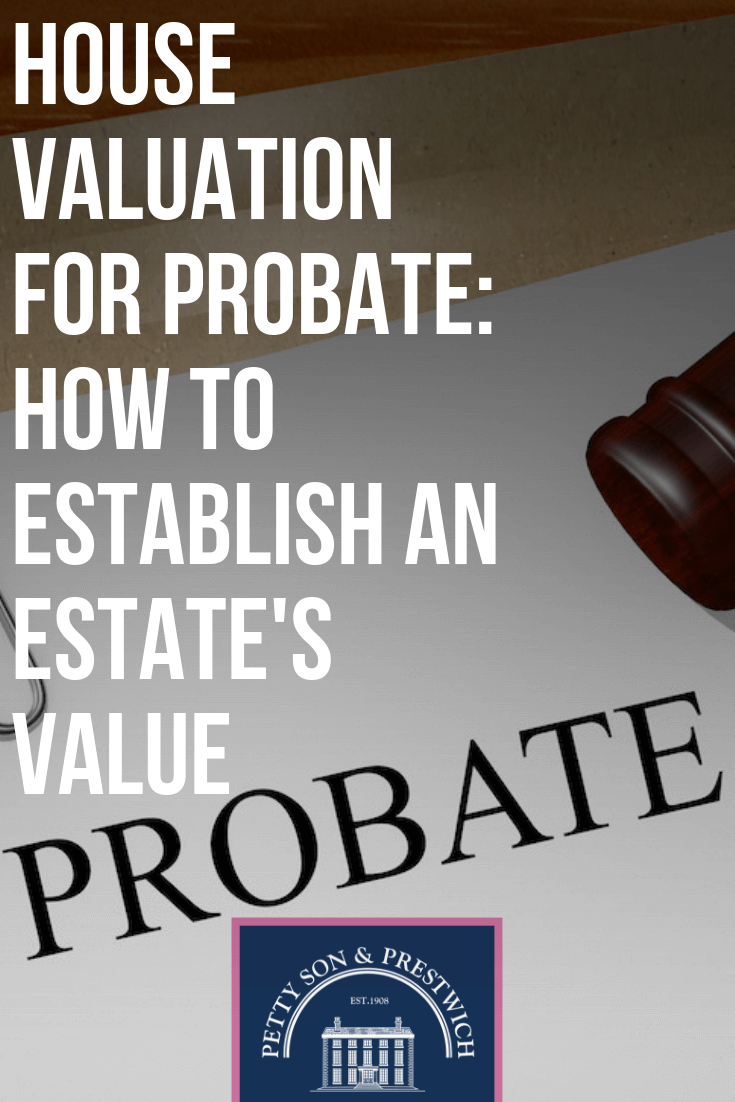Along with everything else you have to deal with following a person’s death, obtaining a house valuation for probate purposes may well end up towards the bottom of your to-do list.
Understandable as this may be, the probate valuation of property and contents is an essential part of the process that has to be dealt with sooner or later. With this in mind, we’ve put together a piece on probate property valuations to answer a few of the most common questions people have when they find themselves in this unenviable situation.
Before we get started, though, you might want to take a look at our other post,
Probate Property: What Is It And What Do I Need To Know?, if you’re unsure of the wider process.
Already fully informed and simply want to find out more about a house valuation for probate? Read on!
What does ‘House Value’ mean in terms of probate?
When it comes to valuing property for probate, the ‘House Value’, as it is commonly referred to, is regarded as its open market value, or OMV for short. As the term suggests, this is the value the property would reasonably be expected to fetch on the open market if sold to a willing buyer. The probate valuation should be in line with the date of transfer, which is usually the day the deceased passed away.
Who is responsible for the probate valuation of property?
As a general rule, the Personal Representatives of the deceased will be the ones responsible for the probate valuation of property and contents. This can include both executors and administrators.
Who can carry out a house valuation for probate?
As stated on gov.uk, you will need a professional valuation on anything considered to be worth more than £500 should the deceased’s estate’s gross value be worth more than £250,000. Anything below this, estimates can be used.
So, when it comes to making a probate property valuation, estate agents and surveyors are your obvious choices, but there are pros and cons to both:
Estate agent’s market appraisal for probate
An estate agent will be able to give you a solid idea of what your property is worth...for free! Although estate agents are not able to provide formal valuations, as this needs to be done by a suitably qualified valuer (either RICS or equivalent), they will happily give you their opinion on the property’s worth. This is called a market appraisal.
The downside to using an estate agent for a market appraisal is that some may inflate the value of the home, providing you with an ‘asking price’ rather than a direct indication of the property’s OMV. It’s easy enough to combat this, though...simply speak to the agent (you can call us on 020 8989 2091). Tell them you require an open market valuation for the purposes of probate and they’ll be happy to help get you the OMV you need to begin filing with HMRC.
It’s also a good idea to get a few different market appraisals and use the average figure from them all, as this will give you a degree of backup should the taxman question your numbers at a later date.
Surveyor’s valuation for probate
If we’re being honest, which is something we pride ourselves on here at Petty’s, a surveyor’s valuation for probate is the better option if your home is of non-standard construction or has any other peculiarities about it.
Similarly, it’s worth talking to a surveyor if the property in question has the potential to be developed or is especially run down. Although there’s nothing written in black an white, it’s also thought that HMRC prefer surveyor’s estimations. There’s also the fact that, should the will be complicated or the estate complex, judges would consider a RICS valuation to carry more weight if there happens to be a court hearing further down the line.
The downside of using a surveyor is obvious: cost. While an estate agent will be happy to provide you with a free house valuation for probate, surveyors most definitely won’t be.
Is a probate house valuation time consuming?
A lot will depend upon the route you take. An estate agent will likely be quicker than a surveyor, and even surveyors’ times can vary dramatically depending on which firm you instruct and what their workload is like.
The wider problem is the valuation of the estate as a whole. This process can take a long time if the estate has a lot of intricacies, and it’s something that can catch people out. While you are not obliged to provide HMRC with any valuations straightaway, there are time limits should the estate fall into the Inheritance Tax band:
Key timeline for estate valuation and HMRC
- Inheritance tax forms should be completed and returned to HMRC within one year
- You need to begin paying tax by the end of the sixth month after the person died (payments can be made before a final valuation is reached)
What about valuing personal possessions for probate?

For most, the physical contents of the home will not equate to much in the way of cash value but hold significant sentimental worth. Should there be items of value present, however, a price will need to be attached to them, and this can be arrived at in a variety of ways.
The most common approach is to simply do the research yourself (the Internet is your friend here). Simply search for similar items online to see what they are currently worth.
Bear in mind, though, that you are not valuing them ‘as new’, but rather in the condition they are in now. Age should also be factored into your estimations, too. Online auction sites are especially handy for this purpose.
Selling inherited property
More details on selling inherited property can be found in the post we linked to at the start of this article, but there are a couple of pertinent points to cover here that directly relate to probate property valuations:
What happens if the house sold for more than probate value?
HMRC could (and have done in the past) try to increase the Inheritance Tax owed should the house be sold for more than the probate value, usually when the sale is made soon after the Grant of Probate has been awarded.
This has been a bone of contention for many who have gone through the probate process and the guidance isn’t exactly clear cut. Although increases of this nature are challengeable by way of negotiations with the District Valuer, it can be both time-consuming and distressing at a point when you least need further aggravation.
Capital Gains can also become an issue if the administration process is prolonged and the final sale price is higher than the probate value. In short, if the property is sold for more than the initial valuation, you could be liable for Capital Gains Tax as well.
How about if the house sold for less than probate value?
On the flipside, a house sold for less than probate value can result in a refund from HMRC for any Inheritance Tax overpayment you may have made. This, however, can only be claimed if the property in question is sold within four years of the deceased’s passing.
Recent shifts in the property market have increased the number of Inheritance Tax refund claims made to HMRC, but it’s well worth consulting a solicitor before trying to attempt the claim yourself.
Common house valuation for probate questions...answered!
That’s it for today. Hopefully we’ve answered any house valuation for probate questions you may have had, but we’re only a phone call away should you need further guidance or would like us to conduct a probate property valuation for you. Our team are always happy to help out.
Before we go, you may also want to check out this post on Gifting Property. Here we cover the pros and cons of using Deed of Gift, including tax implications and risks associated with the process. Take a look!
